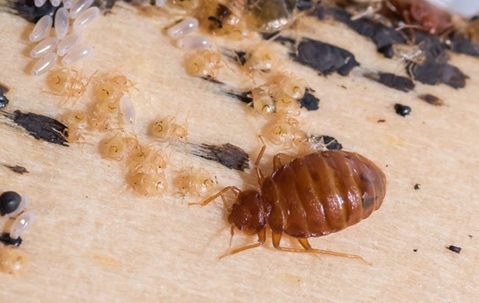Amazing Bed Bug Exterminator Treatment in Houston: Expert Care for Your Home
Amazing Bed Bug Exterminator Treatment in Houston: Expert Care for Your Home
Blog Article
Effective Pest Control Procedures to Protect Your Garden and Plants
In the realm of horticulture, the consistency of a well-tended garden can frequently be disrupted by undesirable bugs that endanger the wellness and vigor of plants. Implementing reliable bug control gauges not just safeguards the yard's aesthetic allure yet additionally plays a pivotal role in maintaining the plants' well-being.
All-natural Pest Repellents

Another reliable all-natural parasite repellent is diatomaceous planet, a fine-grained substance made from fossilized aquatic microorganisms. Diatomaceous planet jobs by literally damaging insects with its rough structure, making it a superb choice for managing bugs like slugs, beetles, and caterpillars. In addition, growing companion plants like marigolds, lavender, or basil can help ward off insects as a result of their solid fragrances or natural chemical compounds.
Beneficial Insects for Parasite Control

One more helpful insect is the parasitical wasp, which lays its eggs inside parasite bugs, at some point eliminating them. Ground beetles are outstanding for managing caterpillars, snails, and slugs. Hoverflies, often mistaken for bees because of their similar look, eat aphids, thrips, and caterpillars.
To attract valuable bugs to your garden, you can plant a diverse variety of blooming plants, such as dill, fennel, and yarrow, which give nectar and pollen for adult insects. In addition, stay clear of using broad-spectrum pesticides that can hurt both damaging and beneficial bugs. By developing an inviting environment for these useful bugs, you can reduce the requirement for chemical pesticides and advertise a much healthier, more balanced garden environment.
Companion Planting Techniques
When aiming to improve the efficiency of beneficial bugs in your yard for natural insect control, taking into consideration friend planting approaches can additionally maximize the ecological community balance. Friend growing includes strategically putting specific plants beside each various other to maximize their mutual benefits, such as discouraging insects, drawing in valuable bugs, or improving nutrient uptake - bed bug exterminator houston near me. One popular instance is planting marigolds together with tomatoes to fend off nematodes and other damaging bugs while also attracting pollinators
In addition, integrating aromatic herbs like basil, mint, or rosemary in between veggie rows can aid prevent bugs with their strong scents. Another reliable method is planting blossoms such as sunflowers, zinnias, or universes to draw in pollinators like bees and butterflies, which subsequently can assist in cross-pollinating your fruit and veggie crops. Additionally, planting investigate this site catch crops like nasturtiums can divert insects away from your major crops, working as sacrificial plants that shield your important produce. By carrying out companion growing methods, you can create a varied and harmonious yard ecological community that normally regulates insects while advertising plant health and wellness and productivity.
DIY Bug Control Solutions
To successfully take care of parasites in your garden, implementing do-it-yourself pest control services can be an affordable and ecologically friendly technique - bed bug exterminator houston near me. Establishing up find more info physical obstacles like row covers or netting can also avoid insects like caterpillars from damaging your plants.
Buddy planting particular herbs and blossoms like marigolds, basil, and lavender can assist fend off parasites and draw in valuable insects. By integrating these DIY insect control solutions you could try this out right into your horticulture routine, you can protect your garden and plants without relying on severe chemicals.
Environmentally-Friendly Pesticides

Another effective option is diatomaceous earth, an all-natural compound made from fossilized water microorganisms, which can be sprinkled around plants to control slugs, snails, and various other creeping pests. Additionally, insecticidal soaps and oils derived from plant-based sources serve for regulating soft-bodied parasites like aphids, mites, and whiteflies.
Conclusion
To conclude, effective parasite control procedures such as natural repellents, useful insects, friend planting methods, DIY solutions, and environmentally-friendly chemicals are critical for securing your garden and plants. By applying these techniques, you can avoid damage caused by parasites and keep a healthy and balanced and flourishing yard ecosystem. It is essential to think about the long-term effect of using chemicals and go with even more sustainable and environmentally friendly choices to make sure the health and health of your plants and the atmosphere.
Report this page